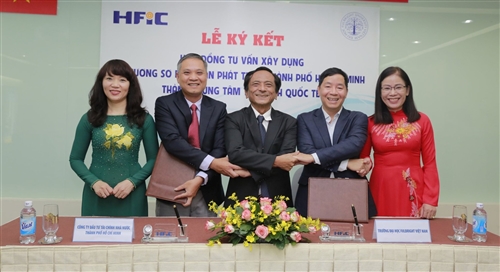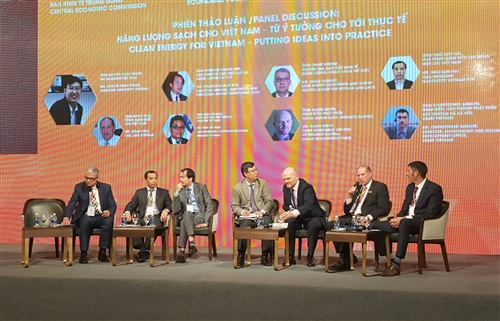Citizen Powered Innovation Innitiative
The United Nations Development Programme (UNDP) granted FSPPM with the total amount of $70,000 for the Citizen Powered Innovation Initiative (CPII) project. FSPPM's research team is commissioned to develop a proposal solicitation to identify and select innovative provincial governments for experimenting citizen powered solutions and conduct scoping study for development of syllabus on digital competencies for the public sector. This project aims to help identify and support provinces which are capable of recognizing and successfully implementing Citizen Power Innovation solutions.
As part of the project, CPII Digital Expo aims to spread the spirit of "citizen powered innovation" and enable UNDP and partners to engage and collaborate with innovative provinces to help scale initiatives that combine citizen engagement and governance innovation. The Digital Expo plans to become a shared forum to promote structured learning, build a community for innovation practice and an "innovation hub" for existing problems in the regions.
Read more on this initiative here.

Hai Phong Development Strategy Project
In July 2021, at the request of research from Hai Phong Department of Planning and Investment (DPI), FSPPM outreach team started the consultancy project for Hai Phong City. The project team carried out initial research to assess provincial current status and study international experiences. In October 2021, the research team of FSPPM presented proposals for Hai Phong City's economic development strategies towards 2030 in a meeting with the municipal Party's Committee and representatives from local departments, agencies, and businesses.
The team members briefed attendants on the key findings of their study, which identified Hai Phong's socio-economic achievements in the last 10 years and its improved status. The study put Hai Phong in comparison with the top 10 provinces and cities in Vietnam in terms of competitiveness and identified weaknesses in previous growth models by examining macro indicators. The report also analyzed effects of satellite city and strategic options available to Hai Phong, summarized SWOT analysis and recommended some solutions and approaches for next period's development.
Read more on this initiative here.
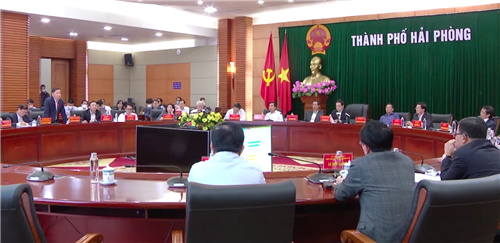
Economic development strategies project for Hau Giang Province
The Fulbright School of Public Policy and Management (FSPPM) recently completed a study proposing economic development strategies for Hau Giang province from now until 2030 with a vision to 2050. The findings of the study will serve as outputs for the provincial government to draft up the socioeconomic development plan for the next 10 years and prepare for the province’s integrated planning in the 2021-2030 period.
The FSPPM research team led by Dr. Vu Thanh Tu Anh, FSPPM conducted the study in May 2021 and submitted the final report in late August 2021. The study analyzes the socioeconomic situation of Hau Giang province in the general context of the Mekong Delta, Vietnam and the world, positions the province’s competitiveness and evaluates the competitiveness of three key industries: processing and manufacturing, high-tech agriculture and logistics. Subsequently, the study puts forward a series of recommendations on the province’s economic development goals for the 2021-2030 period with a vision to 2050, accompanied by development strategies and priority solutions in the 2021-2030 period.
The research team used tools to analyze and compile statistical documents, secondary data and in-depth studies on the natural, geographical, cultural and economic conditions of the Mekong Delta in general and Hau Giang province in particular. They also paid field study trips to hi-tech agricultural zones, industrial zones, big waterways and roads and businesses in the province and conducted in-depth interviews and surveys among local departments, agencies and businesses on the current economic situation and growth bottlenecks that the province is facing. Due to the development of Covid-19, the meeting with the provincial People’s Committee and the Party’s Committee to discuss the key findings of the study and the proposals on the province’s economic development strategies was held online in July 2021.
The project suggests specific development goals in each period, including the targets of building sustainable foundations for economic growth in the 2021-2025 period, turning Hau Giang into a fairly industrialized province in the 2025-2030 period and turning the province into an industrial manufacturing and logistics hub of the Mekong Delta by 2050, raising its status with an average GRDP of US$13,000/capita.
The project also proposes overall strategies for Hau Giang Province to reverse its downturn trend and specific strategies for four areas: industrial development, agricultural and rural development, key industry clusters and urban development.
Read more on this initiative here.
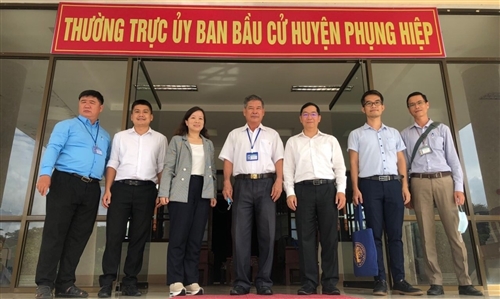
Restructuring the Economy of An Giang Province
A break-through towards sustainable development.
FSPPM becomes a partner with An Giang Province in the project “Restructuring the economy of An Giang Province: A break-through towards sustainable development.” The project is expected to become an important reference source for drafting the 15th Party Document of An Giang Province, from 2020 – 2025. This project is very distinctive. All research, policy discussion and knowledge transfer are interlocked to foster modern understandings of economic strategies and local governance structures. In that sense, breakthrough refers to changes in mission, restructuring the economy and progress in leadership and management perceptions.
Read more on this initiative here.
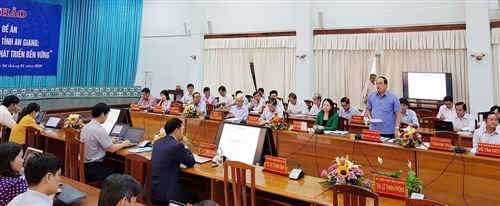
The Economic Development Strategies of Thai Nguyen Province and the Role of Samsung
FSPPM’s research project, “Economic development strategies of Thai Nguyen Province and the role of Samsung,” evaluates the competitiveness of Thai Nguyen province and analyzes the contributing role of Samsung to the area’s long-term growth. On these grounds, FSPPM proposes different recommendations for economic growth during the period 2021-2015 and the outlook towards 2035.
Read more on this initiative here.
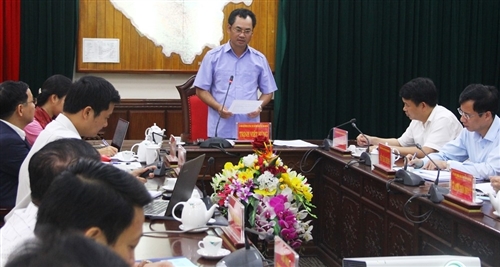
Lower Mekong Public Policy Initiative
The Lower Mekong Public Policy Initiative (LMPPI) was funded by the United States Agency for International Development (USAID). LMPPI sought to generate knowledge, promote learning, and stimulate dialogue on public policies to support environmentally sustainable economic development, increase agricultural productivity and improve household livelihoods in the five countries of the Lower Mekong Basin: Cambodia, Laos, Myanmar, Thailand and Viet Nam.
LMPPI activities were designed to advance a sophisticated understanding of the water-food-energy nexus and to help meet regional decision makers’ needs for research-driven policy analysis in support of sustainable development goals.
Read more on this initiative here.
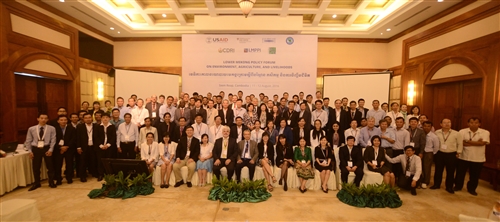
Towards a Big Urban Data Facility (BUDF)
A Case Study on Computational Investigation of the Connectivity, Resilience and Demand of the Bus Network in Ho Chi Minh City
The first “big data” research project by FSPPM is initiated to optimize management and operational capabilities of the public bus system in Ho Chi Minh City. As part of the project, models to analyze the dynamics of public transportation networks are developed to objectively and comprehensively evaluate performance of the city bus services. This the first study attempting to evaluate the operational stability of the bus services using past GPS data. Particularly, These tool sets can be expanded to integrate other public transport modes (e.g. metro system) operating within the city.
Read more on this initiative here.
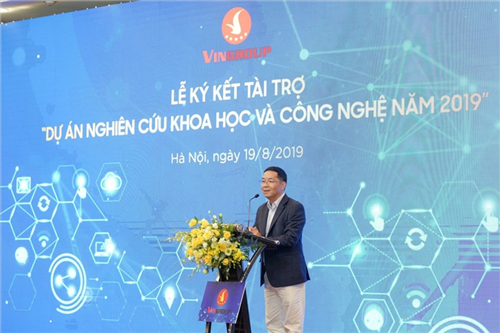
Asia Public Policy Forum
The Asia Public Policy Forum is an annual event that brings together scholars, policymakers, and leaders from business and civil society to discuss an issue of rising importance in the region. The objective of the Forum is to promote interaction among such leading thinkers as a means of stimulating policy innovation and information sharing related to an issue of public concern. It is organized by the HKS Indonesia Program at the Rajawali Foundation Institute for Asia (RFIA), Ash Center for Democratic Governance and Innovation. Previous forums have addressed energy policy, social safety networks, disaster management, and energy policy.
Read more on this initiative here.
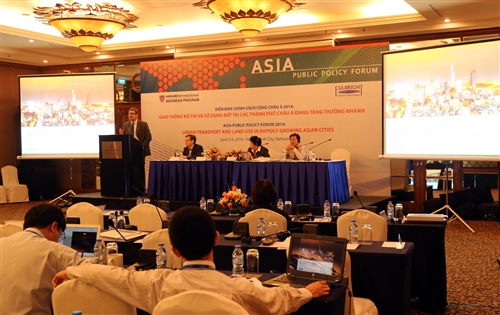
Fulbright's YSEALI Summer School 2015
To celebrate the 20th anniversary of the normalization of relations between Vietnam and the U.S., the U.S. Mission to Vietnam and FSPPM collaborated to organize the Fulbright’s YSEALI Summer School. Fulbright’s YSEALI Summer School hosted 160 YSEALI members from all over Vietnam to a two-week program in August 2015 at the FSPPM campus in Ho Chi Minh City. During the program, the participants deepened their knowledge about issues relating to the ASEAN Economic Community (AEC) and shared their experience and perspectives to help Vietnam reach its fullest potential.
Read more on this initiative here.
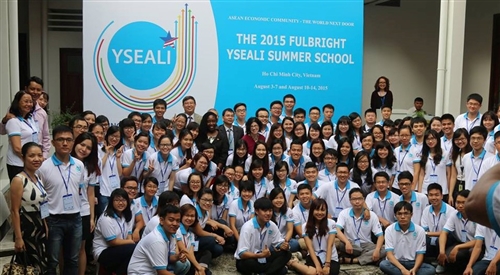
Developing Ho Chi Minh City into an International Financial Center
To realize the aspiration of not only maintaining its leading position in the country, but also narrowing the gap and moving to catch up with successful cities in Southeast Asia and Asia, HCMC People’s Committee commissioned FSPPM to conduct the project Developing Ho Chi Minh City into regional and international financial center. In 2019, FSPPM has completed Phase 1 of the project.
Read more on this initiative here.
